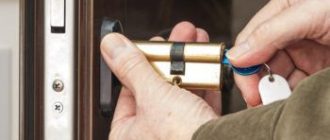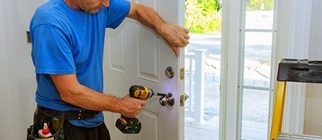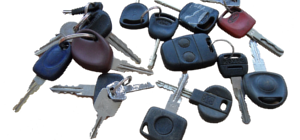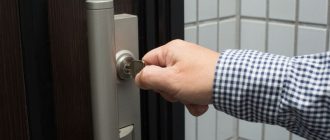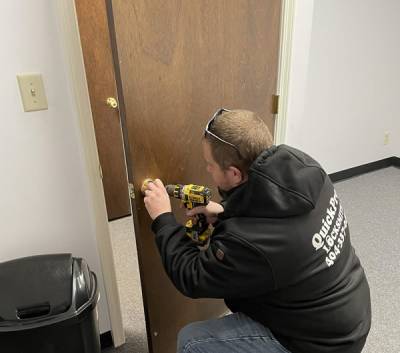
The Time A Locksmith Needs To Open The Door
When you find yourself locked out of your home or car, time becomes of the essence. You need a locksmith who can quickly and efficiently open your door and get you back inside. But just how long does it take for a locksmith to open a door?
The answer to that question depends on a variety of factors. First and foremost, it depends on the type of lock you have. Some locks are easier to pick or manipulate than others, so a skilled locksmith may be able to open them in a matter of minutes. On the other hand, more complex locks, such as high-security or electronic locks, may take longer to open.
Another factor that influences the time it takes for a locksmith to open a door is their level of experience and expertise. A highly experienced locksmith who has dealt with similar locks before will likely be able to open them more quickly than someone who is just starting out in the profession.
Factors That Affect the Time Required
When it comes to opening a door, there are several factors that can affect the time required for a locksmith to complete the job. These factors include:
| Lock Type | The type of lock on the door can significantly impact the time required to open it. Basic locks may be easier to open, while more complex locks, such as deadbolts or high-security locks, may take longer to bypass. |
| Lock Condition | The condition of the lock can also affect the time required. If the lock is old, rusty, or damaged, it may be more difficult to open. |
| Lockout Situation | The specific circumstances of the lockout can also impact the time required. For example, if the door is locked from the inside and the key is lost, it may take longer to gain access compared to a situation where the key is locked inside the property. |
| Locksmith Experience | The experience and skill level of the locksmith can also affect the time required to open a door. A knowledgeable and experienced locksmith may be able to quickly assess the situation and use the most efficient technique to open the door. |
| Tools and Equipment | The tools and equipment available to the locksmith can impact the time required. Specialized tools and equipment designed for lock opening can expedite the process. |
| Accessibility | The accessibility of the door can also influence the time required. If the door is obstructed or located in a hard-to-reach area, it may take longer for the locksmith to gain access. |
Overall, the time required for a locksmith to open a door can vary depending on these factors. It is best to consult with a professional locksmith to get an accurate estimate of the time required for your specific situation.
Types of Locks and Their Complexity
There are various types of locks that locksmiths encounter when they are called to open a door. Each type of lock has its own level of complexity and requires different techniques to unlock. The time it takes for a locksmith to open a door can vary depending on the type of lock they are dealing with.
One of the most common types of locks is the pin tumbler lock. This type of lock consists of a series of pins that must be aligned correctly in order for the lock to be opened. The complexity of pin tumbler locks can vary depending on the number of pins and the level of security they provide. Some pin tumbler locks can be opened fairly quickly, while others may take more time and skill to unlock.
Another type of lock is the wafer lock. These locks use thin wafer tumblers that must be aligned correctly in order to open the lock. Wafer locks are often found in older vehicles and can be more difficult to open than pin tumbler locks.
There are also disc detainer locks, which use discs that must be rotated to specific positions in order to unlock the door. These locks are commonly found on high-security doors and require specialized tools and techniques to open.
In addition to these types of locks, there are also electronic locks that use keypads or keycards to unlock a door. These locks often require a locksmith with specific knowledge and equipment to bypass or reset them.
Overall, the complexity of a lock can greatly impact the time it takes for a locksmith to open a door. Simple pin tumbler locks may be opened quickly, while more complex locks such as disc detainer locks or electronic locks may require more time and expertise to unlock.
Skill Level and Experience of the Locksmith
The skill level and experience of a locksmith can significantly impact the time it takes to open a door. A highly skilled and experienced locksmith will be able to open a door quickly and efficiently, while a less skilled locksmith may take longer to complete the job.
A skilled locksmith will have a deep understanding of different lock mechanisms and techniques for opening them. They will be able to quickly assess the type of lock on the door and determine the best approach for opening it without causing any damage.
In addition to their technical skills, a locksmith’s experience can also play a role in how long it takes to open a door. Experienced locksmiths have likely encountered a wide range of lock types and situations throughout their career, giving them the knowledge and confidence to quickly and effectively open doors.
When choosing a locksmith, it is essential to consider their skill level and experience. A reputable locksmith will have the necessary qualifications and certifications, as well as a track record of successfully opening doors in a timely manner.
It’s always a good idea to hire a skilled and experienced locksmith to ensure that your door is opened quickly and without any damage.
Tools and Equipment Used
A locksmith uses a variety of tools and equipment to open a door, depending on the type of lock and the level of difficulty. These tools are designed to make the process as efficient and quick as possible, ensuring that the locksmith can open the door in the shortest amount of time possible.
Some common tools used by locksmiths include:
Lock Picks: These are thin pieces of metal that are used to manipulate the internal mechanisms of a lock. Lock picks come in many different shapes and sizes, allowing locksmiths to choose the tool that is best suited to the lock they are working on.
Tension Wrenches: Tension wrenches are used to apply pressure to the lock cylinder while the locksmith manipulates the lock picks. This tension helps to keep the pins in place and allows the locksmith to open the lock.
Key Extractors: These tools are used to remove broken or stuck keys from locks. A locksmith may use a key extractor to remove a broken-off key that is preventing the lock from turning.
Drills: In some cases, a locksmith may need to drill into the lock in order to open it. This is typically a last resort, used when other methods have failed or when the lock is damaged.
Bump Keys: Bump keys are specially designed keys that can be used to quickly open certain types of locks. These keys work by applying upward pressure on the lock pins while the key is turned, allowing the pins to align and the lock to be opened.
Locksmith Software and Devices: Some advanced locksmiths may also use specialized software and devices to assist them in opening locks. These tools can help the locksmith determine the correct combination or code for a lock, making it easier to open.
By using these tools and equipment, a skilled locksmith can typically open a door in a relatively short amount of time, depending on the complexity of the lock and the level of skill of the locksmith.
Emergency Situations
In emergency situations, such as being locked out of your home or car, a locksmith’s primary goal is to open the door as quickly and efficiently as possible. The amount of time it takes for a locksmith to open a door can vary depending on several factors, including the type of lock, the complexity of the lock mechanism, and the locksmith’s skill level.
- If you find yourself locked out of your home, a locksmith can typically open a standard lock in under 30 minutes. However, if you have a high-security lock or a more complex lock mechanism, it may take longer.
- For car lockouts, the time it takes for a locksmith to open the door can also vary. In some cases, a locksmith may be able to quickly and easily unlock a car door using specialized tools. However, if the car has a more advanced locking system or if the keys are locked inside the car, it may take longer to gain access.
It’s important to note that in emergency situations, a locksmith will prioritize speed and efficiency while also ensuring that no damage is done to the lock or door. This means that the locksmith will use the most appropriate and non-destructive methods to open the door, whether it’s picking the lock or using specialized tools.
If you find yourself in an emergency situation where you need a locksmith to open a door, it’s best to contact a professional locksmith with experience in emergency lockouts. They will have the knowledge, skills, and tools necessary to quickly and efficiently gain access to your property or vehicle.
Training and Certification
A locksmith’s ability to open a door quickly and efficiently depends on their training and certification. To become a locksmith, individuals must complete a training program that covers various aspects of lock mechanisms, security systems, and key cutting techniques.
The time it takes to complete a locksmith training program can vary, but typically ranges from several months to a year. During this time, aspiring locksmiths learn about different types of locks, including deadbolts, padlocks, and electronic locks. They also learn how to use locksmith tools, such as lock picks and tension wrenches, to open locked doors.
Once the training program is completed, locksmiths can choose to pursue certification to further enhance their skills and demonstrate their expertise in the field. Certification programs typically involve both written examinations and practical assessments, where locksmiths must successfully open different types of doors within a specified time frame.
By obtaining certification, locksmiths prove their proficiency in opening doors quickly and effectively. This certification can give clients peace of mind knowing that they are working with a trained professional who has demonstrated their knowledge and skills in the locksmithing industry.
Overall, the length of time it takes for a locksmith to open a door can be influenced by their training and certification. A well-trained and certified locksmith will be able to open a door efficiently, reducing the time it takes to gain access to a locked space.
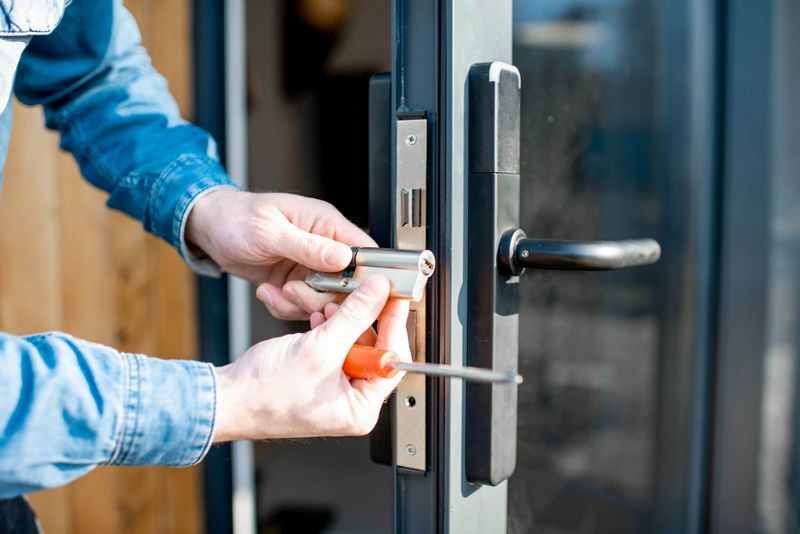
Average Time to Open Different Types of Doors
When it comes to locksmiths and opening doors, the average time it takes can vary depending on the type of door. Here are some estimated times for opening different types of doors:
1. Wooden Doors – On average, it takes a locksmith about 5 to 10 minutes to open a wooden door. Wooden doors are usually easier to open compared to other types of doors due to being less complex.
2. Metal Doors – Opening a metal door can take a bit longer, usually around 10 to 20 minutes. Metal doors are more durable and often have more security features, which can make them more challenging to unlock.
3. UPVC Doors – UPVC doors can take approximately 15 to 30 minutes to open. UPVC doors are commonly found in residential properties and often have multiple locking points, making them more time-consuming to open.
4. Security Doors – Security doors, such as those with reinforced frames and additional locks, can take the longest amount of time to open. It may take a locksmith anywhere between 30 minutes to an hour or more to unlock a security door.
It’s important to note that these are average times and can vary depending on the locksmith’s experience, tools used, and the complexity of the lock. Additionally, emergency situations or unique circumstances may also impact the time it takes to open a door.
Common Techniques Used by Locksmiths
A locksmith is a skilled professional who specializes in opening doors and locks. They employ various techniques depending on the type of lock and the situation at hand. Here are some common techniques used by locksmiths:
1. Lock Picking: Lock picking is a technique that locksmiths use to manipulate the components of a lock in order to bypass its mechanism and open the door. This technique requires skill, knowledge, and specialized tools.
2. Bumping: Bumping is a technique that involves using specially crafted keys, known as bump keys, to manipulate the pins within a lock. By applying pressure and then striking the bump key, locksmiths can move the pins to their shear line and open the lock.
3. Impressioning: Impressioning is a technique that locksmiths use to create a working key for a lock. They insert a blank key into the lock and manipulate it while turning, which leaves marks on the key. By repeating this process and filing down the key based on the marks, locksmiths can create a key that matches the lock.
4. Lock Decoding: Lock decoding is a technique that locksmiths use to determine the internal workings of a lock without disassembling it. By analyzing the key and the way it interacts with the lock, locksmiths can gain insight into the lock’s mechanism and find the best way to open it.
5. Drill and Replace: If other techniques fail or are not possible, locksmiths may resort to drilling the lock and replacing it altogether. This is usually a last resort as it can damage the lock and may require further repairs or replacements.
It is important to note that the time it takes for a locksmith to open a door can vary depending on factors such as the type of lock, the locksmith’s skill level, and the specific circumstances of the situation.
Precautions to Avoid Damages during Door Opening
When it comes to opening a locked door, it is important to take certain precautions to avoid any potential damages. Although time is of the essence, rushing can lead to mistakes and costly repairs. Here are a few precautions that locksmiths take to ensure a smooth and damage-free door opening process:
1. Assess the situation: Before attempting to open a locked door, locksmiths carefully assess the situation. They inspect the lock, determine the type of lock, and evaluate whether there are any alternative methods of gaining access without causing damage. This initial assessment ensures that the right tools and techniques are used.
2. Use proper tools: Experienced locksmiths use specialized tools that are designed for door opening. These tools help to minimize the risk of damage to the lock, door, and surrounding areas. They ensure that only the necessary amount of force is applied to avoid any unnecessary complications.
3. Take precautions for fragile components: Some doors may have fragile components such as glass panels or intricate trims. Locksmiths take extra precautions to protect these components during the door opening process. They use protective coverings or tape to prevent any accidental damage.
4. Employ skilled techniques: Locksmiths are trained in various door opening techniques that minimize the risk of damage. They use their expertise to manipulate the lock and gain access without causing harm to the door or lock mechanism. This skill ensures a quick and efficient door opening process.
5. Communicate with the customer: Throughout the door opening process, locksmiths communicate with the customer to explain the steps being taken. This helps to manage expectations and ensures that the customer understands the potential risks. Open communication also allows the customer to provide any additional information that may assist in the process.
By following these precautions, locksmiths are able to open locked doors efficiently while minimizing the risk of damage. It is vital to hire a professional locksmith who has the expertise and experience to handle door opening tasks with care and precision.
Locksmith’s Code of Ethics and Professional Standards
A locksmith plays a crucial role in ensuring the security of individuals and their property. As such, locksmiths are expected to adhere to a strict code of ethics and professional standards. These guidelines are designed to ensure that locksmiths provide reliable and trustworthy services to their customers.
One important aspect of a locksmith’s code of ethics is respecting the customer’s time. When a customer contacts a locksmith to open a door, they are often in a time-sensitive situation. Whether they are locked out of their home or car, they need assistance quickly. A professional locksmith recognizes the urgency of the situation and strives to arrive at the location as soon as possible.
Once on-site, a skilled locksmith understands the importance of efficiency. They utilize their expertise and tools to open the door swiftly and without causing unnecessary damage. By working efficiently, the locksmith minimizes the disruption to the customer’s schedule and ensures a positive experience.
To meet these standards, locksmiths undergo rigorous training to develop their skills and knowledge. They stay updated on the latest locksmithing techniques and technologies to provide effective solutions to a variety of lock-related issues. By continuously learning and improving, locksmiths are able to enhance their ability to open doors efficiently and professionally.
In addition to technical proficiency, locksmiths also prioritize honesty and integrity. They respect the confidentiality of their customers and maintain strict confidentiality regarding any sensitive information they may come across. Whether unlocking a door or providing security advice, a locksmith strives to act in the best interest of their customers at all times.
By following these ethical guidelines and maintaining professional standards, locksmiths strive to establish trust and reliability with their customers. This commitment to excellence ensures that locksmiths are capable of opening doors in a timely manner while providing exceptional service and maintaining confidentiality.
Cost of Locksmith Services
When you find yourself in a situation where you need a locksmith to open a door, it’s important to know the cost associated with their services. The price can vary depending on several factors, including the time it takes for the locksmith to complete the job.
Locksmiths typically charge an hourly rate for their services. The exact rate may vary depending on the locksmith’s experience and location. In general, you can expect to pay anywhere from $50 to $100 per hour for a locksmith’s services.
The time it takes for a locksmith to open a door can vary depending on the complexity of the lock and the method used to open it. Simple locks can usually be opened within a matter of minutes, while more advanced locks may take longer to open.
It’s important to keep in mind that some locksmiths may charge a flat fee for certain services, such as opening a locked car or rekeying a lock. This fee may not include any additional charges for parts or labor, so be sure to ask for a detailed breakdown of the costs involved.
Additionally, emergency locksmith services may be available for situations where you need immediate assistance. These services may come with an additional fee due to the locksmith’s availability outside of regular business hours.
In conclusion, the cost of locksmith services can vary depending on factors such as the time it takes to open a door. It’s important to discuss the specific details of your situation with the locksmith and ask for a price estimate before agreeing to their services.
Examples of Real-Life Door Opening Scenarios
Here are some common scenarios where a locksmith may need to open a door:
- Locked keys inside a house or apartment
- Lost or stolen keys
- Forgetting the combination or code to a digital lock
- Broken or malfunctioning lock
- Emergency situations where immediate access is required
In these situations, a locksmith is trained to quickly and efficiently open the door using various techniques and tools. The time it takes to open a door can vary depending on factors such as the type of lock, the skill level of the locksmith, and any additional security measures in place.
However, experienced locksmiths are typically able to open a standard door lock within a matter of minutes. More complex locks or additional security measures may require more time and specialized tools.
It’s important to note that a professional locksmith will always attempt to open a door using non-destructive methods, such as picking or bypassing the lock, before resorting to more invasive techniques like drilling or cutting.
Overall, the goal of a locksmith is to provide efficient and effective door opening services while minimizing any damage or disruption to the door or lock.
How to Choose a Reliable Locksmith
When it comes to ensuring the security of your home or business, choosing a reliable locksmith is crucial. Whether you need assistance with a locked door, want to install new locks, or require emergency services, finding the right locksmith is essential. Here are some tips to help you make an informed decision:
1. Research and Reviews: Start by researching local locksmiths in your area. Look for reputable companies with positive customer reviews and ratings. Reading testimonials and feedback from previous clients can give you an idea of their reliability and professionalism.
2. Licensing and Certification: Ensure that the locksmith you choose is licensed and certified. This ensures that they have the necessary training, skills, and knowledge to handle various lock and key issues.
3. 24/7 Availability: Emergencies can happen at any time, so it’s important to choose a locksmith that offers reliable 24/7 services. This ensures that they can assist you with any lock-related problems, no matter the time of day or night.
4. Insurance: Always choose a locksmith who is fully insured. This protects you in case any damage occurs to your property during the job or if any accidents happen on your premises.
5. Price Estimates: Request price estimates from different locksmiths before making a decision. Be wary of extremely low prices as this may indicate poor quality work. Choose a locksmith who provides a fair and transparent pricing structure.
6. Trust and Reliability: Trust is an important factor when choosing a locksmith. Look for a locksmith who is reliable, honest, and has a good reputation in the community. You want someone you can trust to handle your security needs.
7. Range of Services: Consider the services offered by the locksmith. Whether you need help with residential, commercial, or automotive locks, make sure the locksmith has experience in the specific area you require assistance with.
8. Response Time: In emergency situations, response time is crucial. Choose a locksmith who guarantees a fast response time and can quickly resolve your lock-related issues.
By following these tips, you can choose a reliable locksmith who can open your door quickly and efficiently while ensuring the security of your property.
Q&A:
How long does it typically take for a locksmith to open a door?
The time it takes for a locksmith to open a door can vary depending on several factors. In general, it can take anywhere from a few minutes to an hour. However, experienced locksmiths are often able to open a door in less than 10 minutes.
What factors can affect the time it takes for a locksmith to open a door?
There are several factors that can affect how long it takes for a locksmith to open a door. These factors include the type and complexity of the lock, the skills and experience of the locksmith, and the tools they have available. Additionally, if there are any special circumstances or complications, such as a broken lock or a door that is jammed, it may take longer to open the door.
Can a locksmith open any type of lock?
Professional locksmiths are trained and equipped to open a wide variety of locks. They are usually able to open common types of locks, such as deadbolts, padlocks, and cylinder locks. However, there may be some types of locks that are more difficult to open or require specialized skills and tools.
Is it possible for a locksmith to open a door without causing any damage?
In most cases, a skilled locksmith should be able to open a door without causing any damage. They have the knowledge and tools to manipulate the lock and gain entry without needing to break or drill the lock. However, in some rare cases where the lock is extremely damaged or the door is jammed, it may be necessary to use more forceful methods that could result in some damage.
What should I do if I’m locked out of my house and need a locksmith?
If you find yourself locked out of your house, the first thing you should do is remain calm. Then, you can search for a reputable locksmith in your area and give them a call. Explain your situation and provide any necessary details. The locksmith will usually arrive within a reasonable amount of time and assess the situation. They will then work to open the door and gain you entry, usually in a timely manner.

